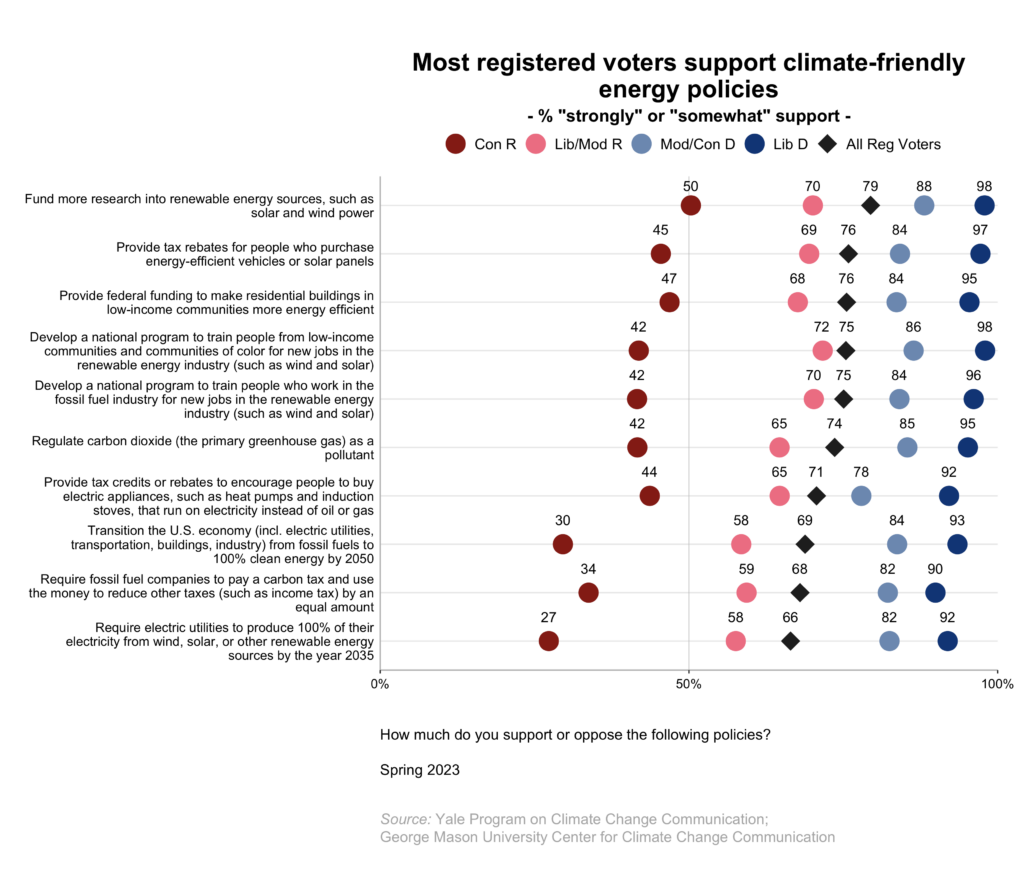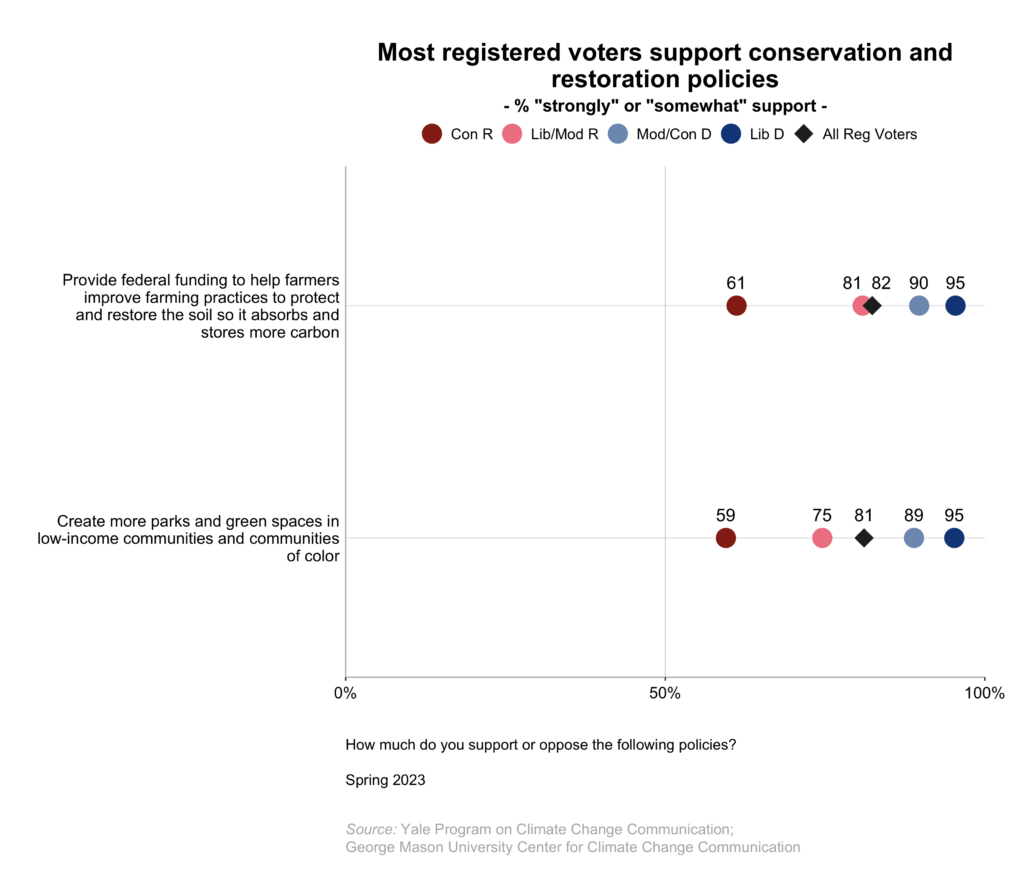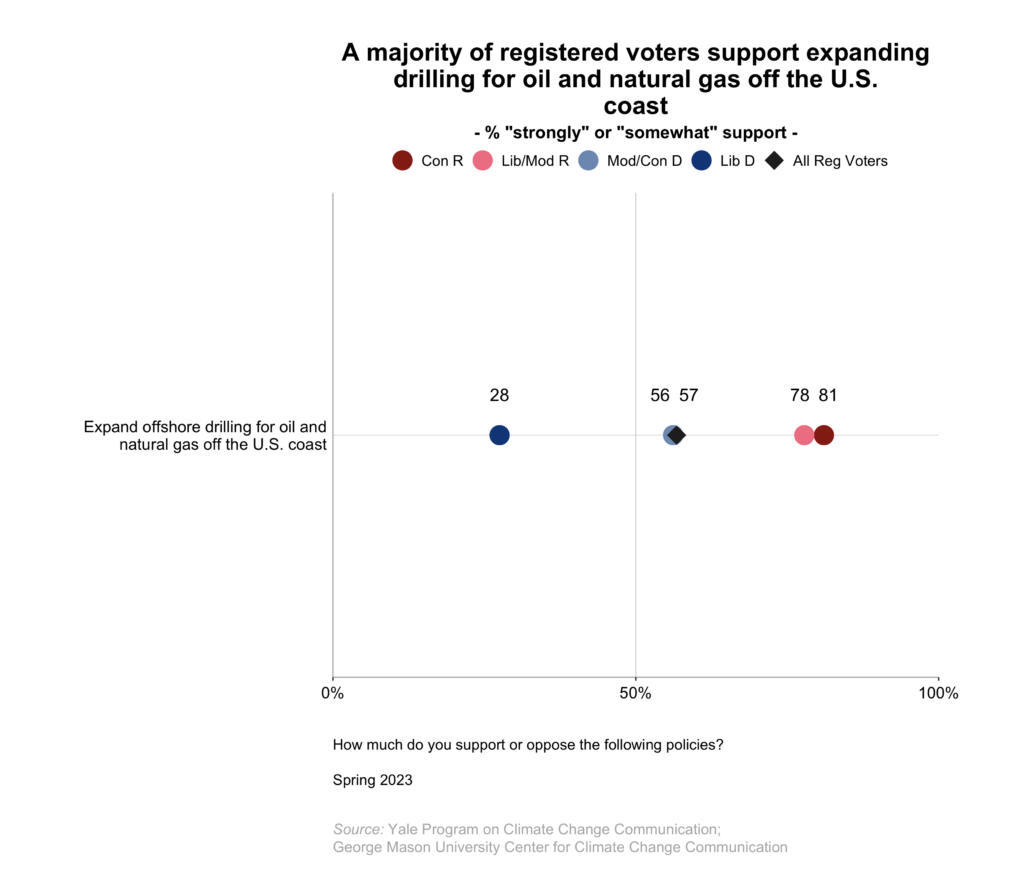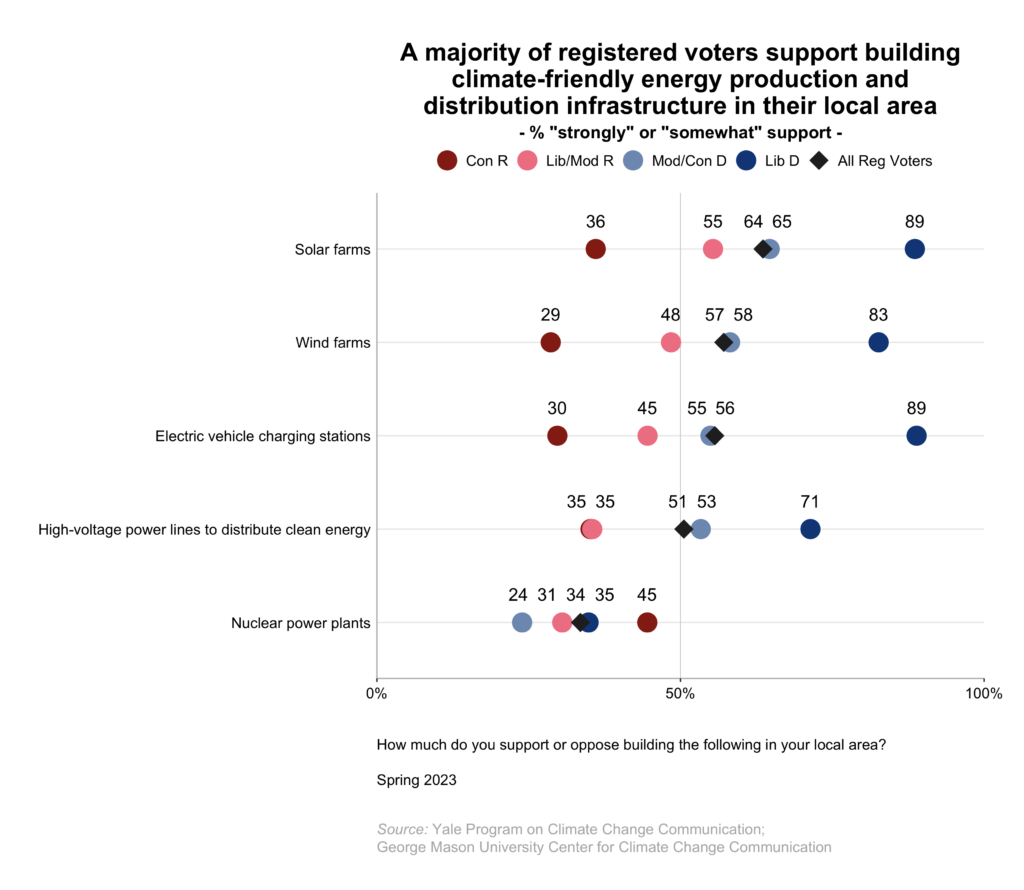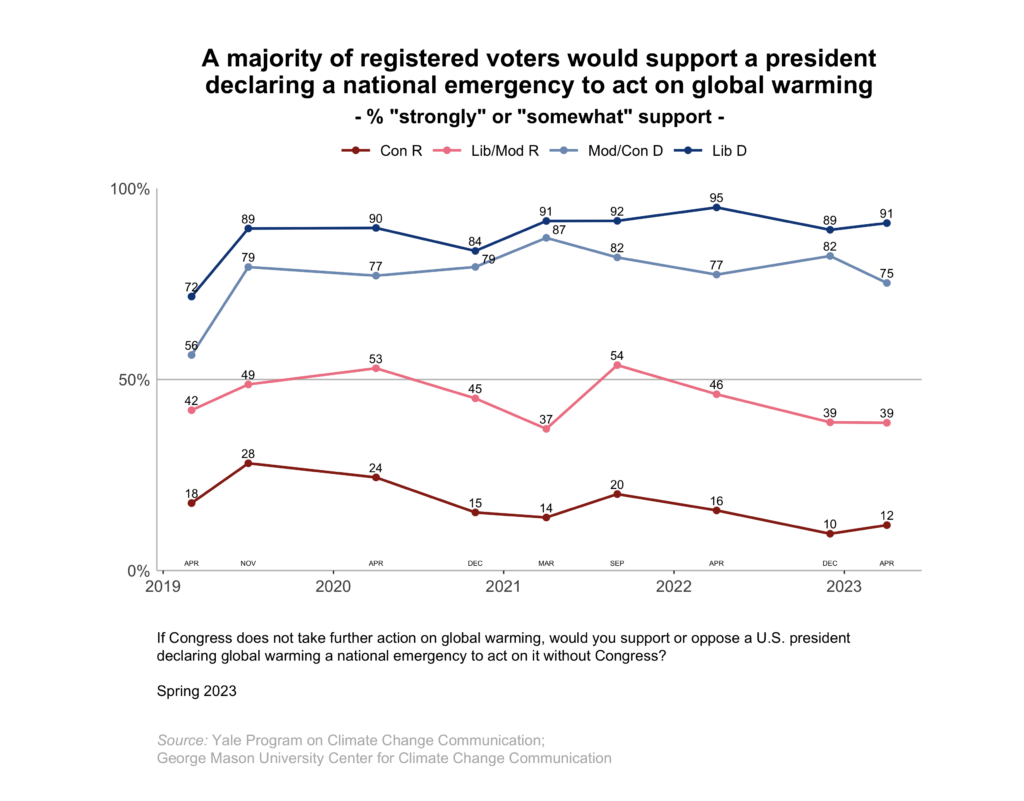Report · Jun 28, 2023
Climate Change in the American Mind: Politics & Policy, Spring 2023
By Anthony Leiserowitz, Edward Maibach, Seth Rosenthal, John Kotcher, Emily Goddard, Matthew Ballew, Jennifer Marlon, Marija Verner, Sanguk Lee, Jennifer Carman, Teresa Myers, Matthew Goldberg and Nicholas Badullovich
Filed under: Policy & Politics
2. Support for Policies to Reduce the Pollution that Causes Global Warming
2.1. Most registered voters support climate-friendly energy policies.
Registered voters across the political spectrum support many energy policies designed to reduce carbon pollution and fossil fuel dependence and promote clean energy, including:
- Funding more research into renewable energy sources: 79% of registered voters, including 98% of liberal Democrats, 88% of moderate/conservative Democrats, 70% of liberal/moderate Republicans, and 50% of conservative Republicans.
- Providing tax rebates to people who purchase energy-efficient vehicles or solar panels: 76% of registered voters, including 97% of liberal Democrats, 84% of moderate/conservative Democrats, 69% of liberal/moderate Republicans, and 45% of conservative Republicans.
- Providing federal funding to make residential buildings in low-income communities more energy efficient: 76% of registered voters, including 95% of liberal Democrats, 84% of moderate/conservative Democrats, 68% of liberal/moderate Republicans, and 47% of conservative Republicans.
- Developing a national program to train people from low-income communities and communities of color for new jobs in the renewable energy industry (such as wind and solar): 75% of registered voters, including 98% of liberal Democrats, 86% of moderate/conservative Democrats, 72% of liberal/moderate Republicans, and 42% of conservative Republicans.
- Developing a national program to train people who work in the fossil fuel industry for new jobs in the renewable energy industry (such as wind and solar): 75% of registered voters, including 96% of liberal Democrats, 84% of moderate/conservative Democrats, 70% of liberal/moderate Republicans, and 42% of conservative Republicans.
- Regulating carbon dioxide as a pollutant: 74% of registered voters, including 95% of liberal Democrats, 85% of moderate/conservative Democrats, 65% of liberal/moderate Republicans, and 42% of conservative Republicans.
- Providing tax credits or rebates to encourage people to buy electric appliances, such as heat pumps and induction stoves, that run on electricity instead of oil or gas: 71% of registered voters, including 92% of liberal Democrats, 78% of moderate/conservative Democrats, 65% of liberal/moderate Republicans, and 44% of conservative Republicans.
- Transitioning the U.S. economy (including electric utilities, transportation, buildings, and industry) from fossil fuels to 100% clean energy by 2050: 69% of registered voters, including 93% of liberal Democrats, 84% of moderate/conservative Democrats, 58% of liberal/moderate Republicans, and 30% of conservative Republicans.
- Requiring fossil fuel companies to pay a carbon tax and using the money to reduce other taxes (such as income tax) by an equal amount [i.e., a revenue-neutral carbon tax]: 68% of registered voters, including 90% of liberal Democrats, 82% of moderate/conservative Democrats, 59% of liberal/moderate Republicans, and 34% of conservative Republicans.
- Requiring electric utilities to produce 100% of their electricity from renewable energy sources by 2035: 66% of registered voters, including 92% of liberal Democrats, 82% of moderate/conservative Democrats, 58% of liberal/moderate Republicans, and 27% of conservative Republicans.
2.2. Most registered voters support conservation and restoration policies.
Registered voters across the political spectrum support a range of conservation and restoration policies, including:
- Providing federal funding to help farmers improve practices to protect and restore the soil so it absorbs more carbon: 82% of registered voters, including 95% of liberal Democrats, 90% of moderate/conservative Democrats, 81% of liberal/moderate Republicans, and 61% of conservative Republicans.
- Creating more parks and green spaces in low-income communities and communities of color: 81% of registered voters, including 95% of liberal Democrats, 89% of moderate/conservative Democrats, 75% of liberal/moderate Republicans, and 59% of conservative Republicans.
2.3. A majority of registered voters support expanding drilling for oil and natural gas off the U.S. coast.
A majority of registered voters (57%) support expanding offshore drilling for oil and natural gas off the U.S. coast. This includes 81% of conservative Republicans, 78% of liberal/moderate Republicans, 56% of moderate/conservative Democrats, and 28% of liberal Democrats.
2.4. A majority of registered voters support building climate-friendly energy production and distribution infrastructure in their local area.
Majorities of registered voters support climate-friendly energy production and distribution infrastructure in their local area, including solar farms (64%), wind farms (57%), electric vehicle charging stations (56%), and high-voltage power lines to distribute clean energy (51%). This generally includes majorities of liberal Democrats and moderate/conservative Democrats, and many liberal/moderate Republicans, but fewer conservative Republicans:
- Solar farms: liberal Democrats, 89%; moderate/conservative Democrats, 65%; liberal/moderate Republicans, 55%; conservative Republicans, 36%.
- Wind farms: liberal Democrats, 83%; moderate/conservative Democrats, 58%; liberal/moderate Republicans, 48%; conservative Republicans, 29%.
- Electric vehicle charging stations: liberal Democrats, 89%; moderate/conservative Democrats, 55%; liberal/moderate Republicans, 45%; conservative Republicans, 30%.
- High-voltage power lines to distribute clean energy: liberal Democrats, 71%; moderate/conservative Democrats, 53%; liberal/moderate Republicans, 35%; conservative Republicans, 35%.
Fewer registered voters support building nuclear power plants in their local area (34%), including 45% of conservative Republicans, 35% of liberal Democrats, 31% of liberal moderate Republicans, and 24% of moderate/conservative Democrats.
2.5. A majority of registered voters would support a president declaring a national emergency to act on global warming.
More than half of registered voters (57%) would either “strongly” (23%) or “somewhat” (34%) support a U.S. president declaring global warming a national emergency to act on it if Congress does not take further action (refer to data tables, p. 36). This would be supported by large majorities of liberal Democrats (91%, with 45% saying they “strongly support” it; refer to data tables) and moderate/conservative Democrats (75%; 29% strongly support). By contrast, 39% of liberal/moderate Republicans and 12% of conservative Republicans would support it, while 86% of conservative Republicans would oppose it (including 72% who would “strongly oppose” it; refer to data tables).
